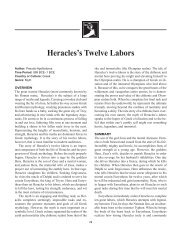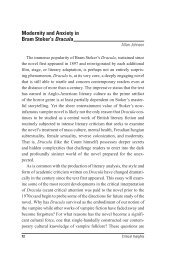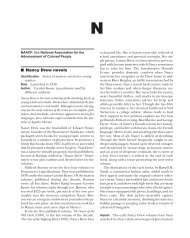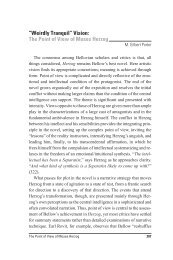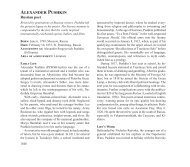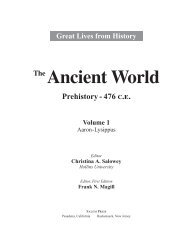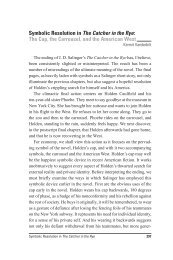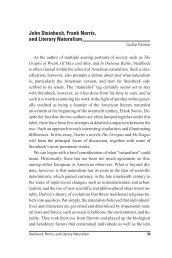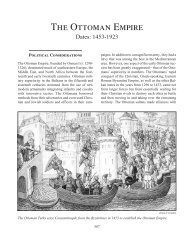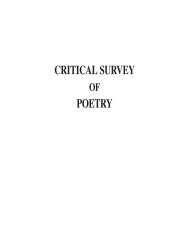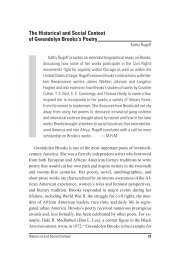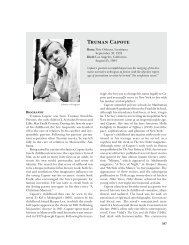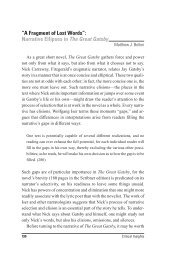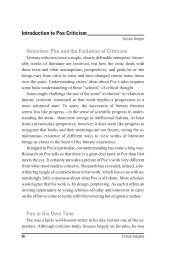Gabriel García Márquez: Cultural and Historical ... - Salem Press
Gabriel García Márquez: Cultural and Historical ... - Salem Press
Gabriel García Márquez: Cultural and Historical ... - Salem Press
Create successful ePaper yourself
Turn your PDF publications into a flip-book with our unique Google optimized e-Paper software.
evolutionaries, he is often criticized in Latin America for remaining<br />
close to Castro; unlike many artists <strong>and</strong> writers who later changed their<br />
views about the Castro regime, <strong>García</strong> <strong>Márquez</strong> has always supported<br />
the Cuban Revolution.<br />
Though <strong>García</strong> <strong>Márquez</strong> is a social critic in his fiction <strong>and</strong> assertively<br />
leftist in politics, his fiction is not didactic or overtly political.<br />
Turning to journalism instead of fiction to deal directly with political<br />
<strong>and</strong> social issues, <strong>García</strong> <strong>Márquez</strong> rejects social-protest literature, believing<br />
it limits artistic expression <strong>and</strong> freedom. Yet nearly all of his<br />
work addresses social-political concerns in some way—though often<br />
subtly. His fiction examines the realities of late-colonial <strong>and</strong> postcolonial<br />
history <strong>and</strong> cultures in the Americas while also exploring the<br />
truths <strong>and</strong> myths of national histories. Though critics focus on the<br />
Magical Realism of his work, <strong>García</strong> <strong>Márquez</strong> claims he writes “socialist<br />
realism,” <strong>and</strong> critic Raymond Williams agrees: “One Hundred<br />
Years of Solitude might seem at first like a book of fantasy, but it is one<br />
of the most historical books of the Boom <strong>and</strong> it abounds in social <strong>and</strong><br />
political implications” (96). Constant political discontent, national instability,<br />
<strong>and</strong> Colombian history <strong>and</strong> myths have shaped not only<br />
<strong>García</strong> <strong>Márquez</strong>’s ideology but also the gr<strong>and</strong> scope <strong>and</strong> depth of his<br />
fiction.<br />
After a focus on journalism, <strong>García</strong> <strong>Márquez</strong> broke his literary silence<br />
with the publication of the highly acclaimed short novel Chronicle<br />
of a Death Foretold, based on a 1951 newspaper article involving<br />
honor <strong>and</strong> death in Colombia. Two million copies were printed in Colombia,<br />
Argentina, Spain, <strong>and</strong> Mexico. The novel, which consists of<br />
five untitled chapters, explores why an entire town allows a senseless<br />
murder to occur. It uses many conventions of the classical detective<br />
genre but also subverts these conventions <strong>and</strong> presents the sequence of<br />
events in reverse.<br />
On December 5, 1985, a million copies of Love in the Time of Cholera<br />
were released in the world’s four most populous Spanish-speaking<br />
countries. This book, one of <strong>García</strong> <strong>Márquez</strong>’s most popular, is a love<br />
28 Critical Insights



